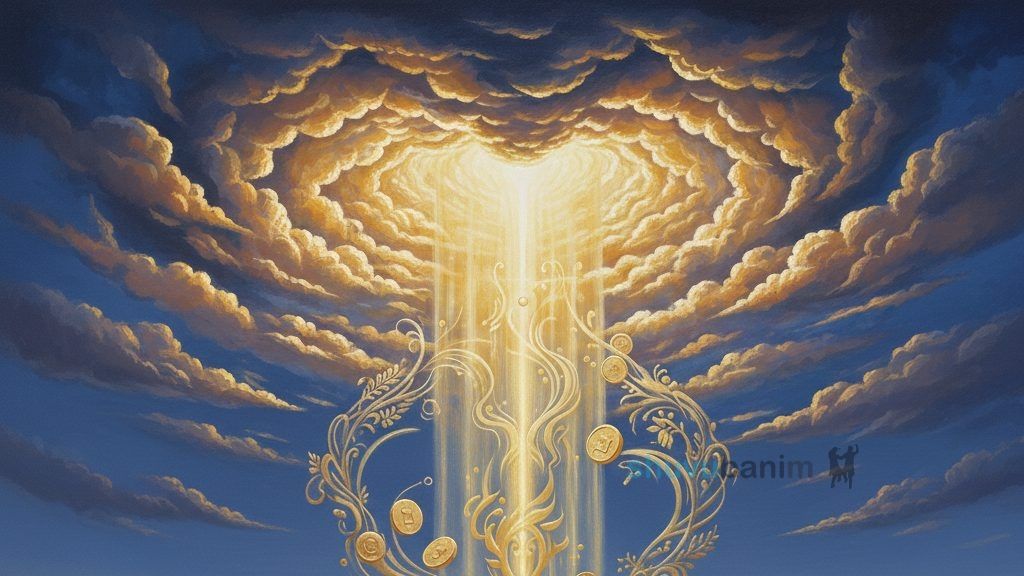עָבִים אוֹמְרִים - Thick Clouds Say:
Tehillim 18:12
יָשֶׁת חֹשֶׁךְ | סִתְרוֹ סְבִיבוֹתָיו סֻכָּתוֹ חֶשְׁכַת מַיִם עָבֵי שְׁחָקִים
yashet choshech sitro sevivotav sukato cheshchat-mayim avei shechakim
He made darkness His hiding place, His pavillion round about Him;
darkness of waters, thick clouds of the skies.
Now David describes the fifth form of divine retribution, by water and torrential rain, as happened to the Flood Generation.
"He made darkness... thick clouds of the skies." G-d put darkness round about His pavilion, to be at hand for use against His enemies. "Darkness of waters" (cheshchat-mayim) means an accumulation of clouds; "thick clouds of the skies" (avei shechakim) means clouds that cover the sky.
Some explain that the verse refers to David himself. G-d "made darkness" - placed upon him a cover of darkness - as "his hiding place," that is, to conceal him from his enemies.
Some commentaries emphasize the link between the present verse and what came before. Because G-d's wrath flamed forth against His enemies, and out of His mouth came burning coals and hailstones that devoured (v18:9), they pierced through the thick clouds. The "darkness of waters" did not extinguish the coals and lightning bolts that flamed from His mouth.
Here cheshchat is appropriately translated as "darkness." Elsewhere we find the expression chashrat mayim, which means a gathering of waters. That is to say, waters gathered from everywhere in the form of vapors to form clouds. Darkness ensued as a result of the clouds - cheshchat-mayim.
Then again, "He made darkness His Place" alludes to the profound difficulty of knowing G-d, just as it is impossible to know what is inside a dark place. For our material aspect keeps us separated from knowledge of the Almighty.
The "darkness of waters" that are in the thick clouds of the skies are the darkness that is about Him. Lest you say that within the darkness there is no light, Scripture tells us: From the brightness before Him, and from within His partition, His thick clouds that are about Him are split, and hail and coals of fire pass through them. (Rashi)
"He made darkness His hiding place", referring to the spiritual source of darkness which in truth is loftier even than the revealed light and is therefore (called darkness, for it is) too intense to be perceived by any mortal, seeing creature (Likutei Sichot vol. 11.p.132)
Concerning this it is stated, “He reveals deep things from the darkness” (Iyov 12:22) The “darkness” is the essential hiddenness of the Ein Sof which is known as “His hidden darkness” (Tehillim 18:12) the level at which He is “hidden from all the hidden.” And out of this darkness is the above point revealed. After the contraction and concealment referred to as “the deep things” of “His hidden darkness” there is a revelation of light; yet this revelation is only a point, and is still concealed in relation to the hishtalshelut of [the development of] the worlds. For even though at this stage the point which remains of the light is still considered concealed in relation to the hishtalshelut of the worlds, its ultimate revelation for the sake of this hishtalshelut can take place only after the point’s expansion. As a “point” it is still beyond revelation. It is called ayin (“nothingness”) relative to both G-d’s essential Being and to the worlds; to Atzmut (Essence) because it is insignificant in comparison, and to the worlds because it is not yet revealed.
The attribute of Netzach is the inner dimension of Keter which is referred to by the phrase: “He made darkness His hidding place [concealment]," [i.e., it is a quality] above revelation.





















